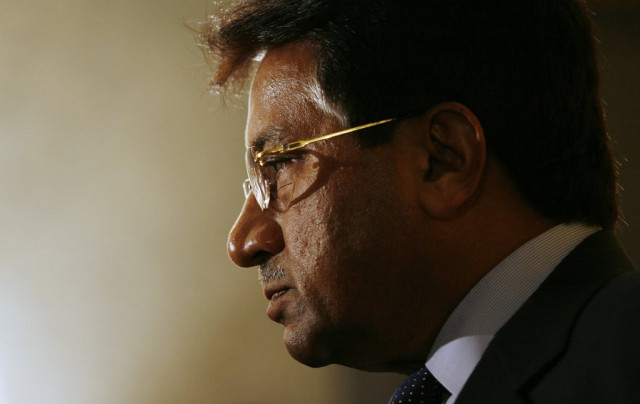Lal Masjid operation: Musharraf charged with another murder
Police register FIR against ex-army chief in connection with the death of cleric Abdur Rashid Ghazi.

The police had earlier stated that Musharraf was not directly involved in the case as the Lal Masjid operation was ordered by the then federal cabinet, led then prime minister Shaukat Aziz. PHOTO: REUTERS/FILE
The police on Monday registered a murder case against former military ruler Pervez Musharraf in connection with the death of a defiant cleric during an army assault against the radicals holed up in Lal Masjid.
Abdur Rashid Ghazi, the deputy cleric of Lal Masjid, his mother and an unspecified number of people – including women – were killed when army commandos stormed the mosque and adjacent seminary, Jamia Hafsa, in the Abpara neighbourhood of Islamabad on July 10, 2007.
Musharraf, who ended his four-year self-imposed exile in March, is already facing a slew of court challenges. Last month, an anti-terrorism court charged the former general with the 2007 murder of former prime minister Benazir Bhutto.

The Aabpara police registered the FIR under Section 302/109 on the Islamabad High Court (IHC) premises on the orders of Justice Noorul Haq N Qureshi, who was hearing contempt proceedings against the police for not complying with the court’s earlier orders.
On August 30, 2013 the same bench had summoned Aabpara police station SHO Qasim Niazi to appear before the court on September 2 and explain why an FIR had not been registered despite the court orders.
When the proceedings began on Monday, the court expressed anger over non-compliance of its orders. “Despite the clear direction of the court, you did not register the FIR,” said Justice Qureshi in a packed courtroom.
Niazi said it was high-profile case and he had sought opinion from his legal department as well as the law ministry.
After the court’s orders, there was no space for ill-will, an unfazed judge shot back. “It’s your job to register a case when you receive a complaint against anyone,” he said and ordered the SHO to register the FIR against Musharraf in the courtroom.
The police had earlier stated that Musharraf was not directly involved in the case as the Lal Masjid operation was ordered by the then federal cabinet, led then prime minister Shaukat Aziz.
On July 12, 2013, the IHC had ordered the police to book the former president “if the Lal Masjid operation was a cognisable offence”.
“We approached the police station after the court’s decision. However, both the SSP and the SHO refused to register the case,” Advocate Tariq Asad, the counsel for the petitioner, told the court earlier, requesting that a criminal case be registered against Musharraf.

The petitioner in the case is Haroonur Rashid Ghazi, the son of the slain cleric Abdur Rashid Ghazi.
It is the latest in a series of charges dating back to Musharraf’s 1999-2008 rule. An anti-terrorism court last month charged Musharraf with the 2007 assassination of former prime minister Benazir Bhutto.
It was the first time a former head of Pakistan Army has been charged with a crime, challenging beliefs that the military is immune from prosecution and threatening to fan tensions with civilian institutions.
While murder will be difficult to prove, it may embolden efforts to try Musharraf for treason for seizing power in 1999 and for violating the constitution by sacking judges and imposing emergency rule in 2007.
Musharraf also faces murder accusations over the death of Jamhoori Wattan Party chief Nawab Akbar Bugti in a military operation in Kohlu, Balochistan, in August 2006.
Musharraf has been under house arrest at his plush villa in Chak Shahzad, on the edge of Islamabad since April.
Published in The Express Tribune, September 3rd, 2013.

1724319076-0/Untitled-design-(5)1724319076-0-208x130.webp)

















COMMENTS
Comments are moderated and generally will be posted if they are on-topic and not abusive.
For more information, please see our Comments FAQ